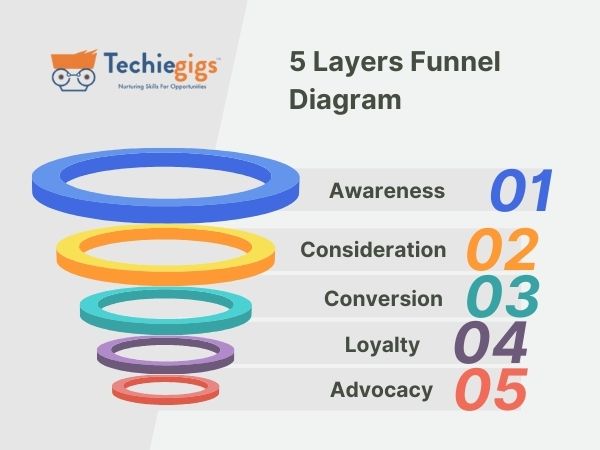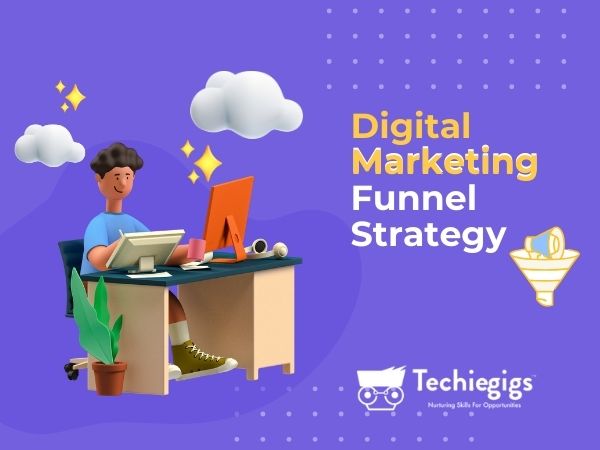The Digital Marketing Funnel is a critical framework for businesses seeking to optimize their marketing strategies. It represents the journey a customer takes from first discovering a brand to becoming a loyal advocate. By understanding the Funnel of Digital Marketing, marketers can tailor their efforts to meet customer needs at every stage, ensuring effective conversions and sustainable growth.
What is the Digital Marketing Funnel?
The Funnel of digital marketing is a step-by-step model that maps out the customer’s path. It begins with awareness and extends through consideration, conversion, and loyalty. Each stage requires specific strategies and tactics to guide potential customers through the funnel.
The funnel’s primary purpose is to ensure that marketing efforts resonate with target audiences, delivering the right message at the right time. By aligning marketing strategies with the funnel, businesses can maximize their return on investment (ROI).
The Stages of the Digital Marketing Funnel

1. Awareness
The first stage of the funnel is awareness. At this stage, potential customers become aware of your brand, product, or service. The goal here is to capture attention and create a positive first impression.
Strategies for Awareness:
- Content Marketing: Publish high-quality blog posts, videos, and infographics.
- Social Media Marketing: Leverage platforms like Instagram, LinkedIn, and Facebook.
- Search Engine Optimization (SEO): Optimize content to rank for relevant keywords.
- Pay-Per-Click (PPC) Advertising: Use Google Ads to target specific demographics.
2. Consideration
During the consideration stage, prospects evaluate whether your offering meets their needs. This is where you build trust and provide value.
Strategies for Consideration:
- Email Marketing: Send personalized email sequences.
- Retargeting Ads: Re-engage users who visited your website.
- Webinars and Case Studies: Showcase expertise and success stories.
- Social Proof: Highlight testimonials and reviews.
3. Conversion
Conversion is the stage where prospects take the desired action—making a purchase, signing up, or subscribing.
Strategies for Conversion:
- Landing Pages: Design optimized pages with clear calls-to-action (CTAs).
- A/B Testing: Test different variations of your campaigns.
- Discounts and Offers: Provide incentives to encourage quick decisions.
- Simplified Checkout Processes: Reduce friction in transactions.
4. Loyalty
The journey doesn’t end with conversion. Building customer loyalty ensures long-term success and repeat business. The loyalty stage focuses on nurturing relationships with your existing customer base.
Strategies for Loyalty:
- Loyalty Programs: Offer points or rewards for repeat purchases.
- Exclusive Content: Share insights, tips, or special offers.
- Follow-Up Emails: Stay in touch post-purchase.
- Social Engagement: Respond to comments and feedback.
5. Advocacy
Advocacy is the final stage of the Digital Marketing Funnel, where loyal customers become brand ambassadors. Advocates promote your brand through word-of-mouth or social proof.
Strategies for Advocacy:
- Referral Programs: Encourage customers to refer friends.
- User-Generated Content (UGC): Share customer reviews and stories.
- Engaging with Advocates: Recognize and reward loyal fans.
- Community Building: Foster a sense of belonging among your audience.
Why is the Digital Marketing Funnel Important?
The Funnel of Digital Marketing is essential because it provides a structured approach to nurturing leads and converting them into paying customers. It helps businesses:
- Identify Pain Points: Understand what prospects need at each stage.
- Allocate Resources Effectively: Focus efforts on high-impact activities.
- Optimize Customer Experience: Deliver personalized experiences.
- Measure Success: Track metrics such as conversion rates and ROI.
How to Implement a Digital Marketing Funnel Strategy

1. Define Your Audience
Identify your ideal customer personas. Understand their demographics, interests, and challenges.
2. Map the Customer Journey
Outline the steps prospects take from awareness to advocacy. Identify key touchpoints and potential barriers.
3. Create Targeted Content
Develop content tailored to each stage of the funnel. Use blogs, videos, emails, and social media to address customer needs.
4. Use Analytics
Leverage tools like Google Analytics to monitor user behavior and campaign performance. Adjust strategies based on data insights.
5. Automate Where Possible
Use marketing automation tools to streamline processes, such as email sequences or retargeting campaigns.
6. Test and Optimize
Continuously test different strategies. Use A/B testing to find what works best for your audience.
Common Challenges in the Digital Marketing Funnel
1. Low Awareness
If your brand struggles with visibility, focus on content marketing and SEO.
2. High Drop-Off Rates
Analyze where prospects are leaving the funnel. Optimize landing pages and reduce checkout friction.
3. Lack of Engagement
Use interactive content, such as polls or quizzes, to re-engage your audience.
4. Poor Customer Retention
Enhance loyalty programs and improve customer support to build long-term relationships.
Metrics to Track in the Digital Marketing Funnel

- Traffic: Monitor website visits and social media engagement.
- Conversion Rates: Measure the percentage of users taking desired actions.
- Customer Acquisition Cost (CAC): Calculate how much it costs to acquire a new customer.
- Lifetime Value (LTV): Assess the total revenue generated by a customer over their lifetime.
- Engagement Metrics: Track likes, shares, and comments to measure interest.
Tips for Optimizing the Funnel of Digital Marketing
- Focus on Mobile: Ensure your campaigns are mobile-friendly.
- Personalize Experiences: Use dynamic content to address individual needs.
- Collaborate Across Teams: Align marketing, sales, and customer support teams.
- Invest in Tools: Use CRM systems and analytics platforms.
- Stay Updated: Keep up with digital marketing trends to remain competitive.
Conclusion
Mastering the Digital Marketing Funnel is essential for any business looking to succeed in today’s competitive landscape. By understanding each stage and implementing tailored strategies, you can effectively guide prospects through their journey and convert them into loyal advocates. Focus on delivering value, building trust, and optimizing every touchpoint to create a seamless customer experience.
To take your understanding of the Digital Marketing Funnel and other key marketing strategies to the next level, consider reaching out to Techiegigs. This institute offers comprehensive courses designed to equip you with the knowledge and skills needed to thrive in the ever-evolving world of digital marketing. Whether you’re looking to refine your strategies or deepen your expertise, Techiegigs provides the resources and guidance necessary to enhance your capabilities.


